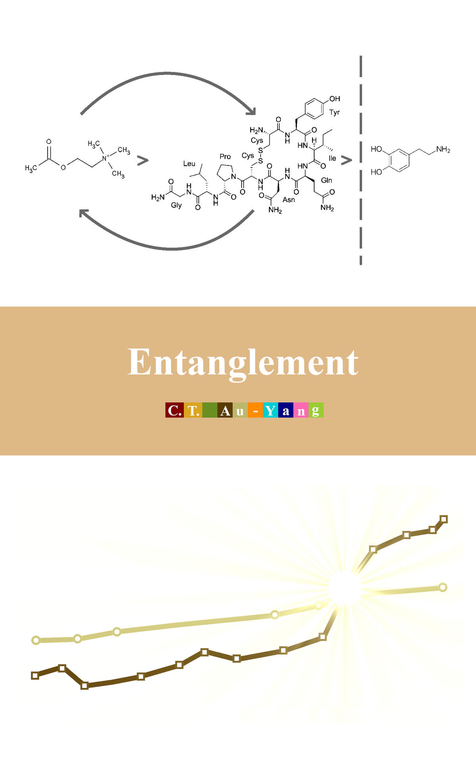
Two very different minds collide in romance and conversation, exploring the deep themes of love, intellect, purpose and the future in Entanglement by C.T. Au-Yang. Self-described as a unique dissection of love and attraction, this unusual narrative depicts the classic tale of boy meets girl, but their strange connection is unlike any other.
Andrew is an intellectual, an introvert, and an observer – a researcher who has chosen to explore civilizations from the past and present to develop a model about Civilization DNA. He is also performing some personal experiments, namely stacking neural-enhancing supplements and acetylcholine, claiming to be acetylcholinergic, rather than dopaminergic. Bella is the wary object of his curiosity, or desire, and through a common coffee shop in Dublin, their worlds and minds begin to mix.
From deep examinations of logic and reasoning to discussions of gender fluidity, beauty and loneliness, these two eccentric characters are described through ongoing debates of their personal beliefs, rather than their actual personalities. Andrew is cold and scientific, while Bella is more apt to veer into emotional understanding, and watching these two balance one another is an interesting journey.
The prose is interspersed with sections of poetry or stream of consciousness, as well as photographs of different sculptures, symbolically unclear pictograms, and street scenes. All of these elements create an odd tone, making the entire story feel like an allegory or a puzzle to be solved. There is a clear narrative arc, but few fundamental conflicts. Examining large-scale ideas through storytelling can be done well, but too little time is spent on these explorations, and the observations and conclusions are somewhat basic, despite being presented as profound.
The powerful themes being explicated are unfortunately overshadowed by the glaring grammatical issues and linguistic errors, making some ideas downright unintelligible. While many authors are not native English speakers, it is essential to find a professional editor in such cases before publishing. Within the first few pages, it becomes abundantly clear that the language will be an issue, with incorrect prepositions and possessives, awkward syntax, and improper use of vocabulary. The subjects Yang is trying to discuss are metaphysical and abstract, but these restrictions on language make the points and conclusions far weaker.
While Andrew is highly developed and seems to take the lead in most of these heady conversations, Bella is often used as a foil, and feels more functional as a prop than a real person. The repetition of certain lines, such as the beginning of chapters describing where the pair meet and how many times they have seen each other, are opportunities for some descriptive flair, but there is only the most basic level of scene detail. The main character’s dialogue and view of the world are stark, but the narrative voice doesn’t necessarily need to reflect that so closely. Additionally, Andrew’s diatribes are interesting, but often tangential and disconcertingly calculated, making it difficult for readers to relate or follow.
All in all, Entanglement is a uniquely cerebral exploration of romance, but needs a comprehensive edit to make good on its bevvy of thought-provoking ideas.
Book Links
STAR RATING
Design
Content
Editing
Get an Editorial Review | Get Amazon Sales & Reviews | Get Edited | Get Beta Readers | Enter the SPR Book Awards | Other Marketing Services























Leave A Comment